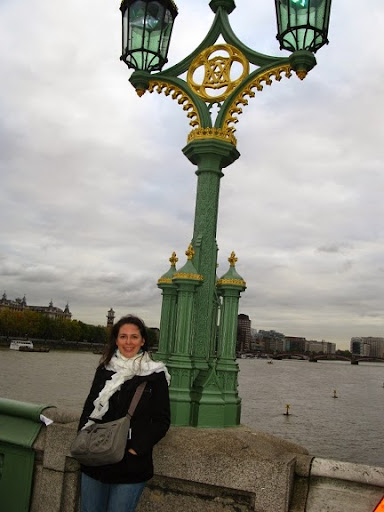#StudyAbroadBecause it’ll help you navigate other social codes more fluently
H.E. is a TCK [Third Culture Kid] (French/German) who grew up in Luxembourg. She got her BA in the USA and her MA in England. She is the author of Culture Shock - A Practical Guide (read our interview with her here!) and Culture Shock Toolbox. Both projects offer support to international students, expats, and travelers dealing with cultural transitions.

H.E. in London
What motivated your decision to go abroad? How/why did you choose where to go?
As a TCK, I’ve always lived abroad, and studying in Germany or France just because they were my passport countries never entered my mind. I grew up speaking French and German and started learning English in high school. By the time I graduated, I wasn’t as comfortable communicating in English as I wanted to be, so I decided to study in English speaking countries. I’ve always felt drawn to the English language.
What was your experience like? What is your favorite memory? What were some challenges you observed?
My favorite memories are about moments of connection and shared experiences, moments of awe, and moments when a shift happened and my perspective changed. A few examples:
One year I shared a house with about 9 other students, and at some point we started a weekly cooking night. Every week two different people would team up, do the grocery shopping, and cook for everyone. Then we would all squeeze and huddle around the table to eat together! In California, the desert and the coast are awe-inspiring.
Sometimes shifts and changes happen in defining moments, but often they happen slowly and almost imperceptibly over time. One defining moment for me happened in Professor Ngugi wa Thiong’o’s class. He told a story about several blind people who want to know what an elephant looks like. They’re led to an elephant and one touches its tail, the other the trunk, another a leg, another an ear, another the stomach. They all think they now know what an elephant looks like. The one who touched the trunk thinks it’s tubular and a little hairy. The one who touched the stomach thinks it’s enormous and round. The one who touched the ear thinks it’s flat and floppy...and so on. The thing is, they’re all right. But you only get the whole picture when all perspectives are put together. That allegory really stayed with me.
Of course there were also a lot of challenges: learning to understand regional accents in England and America for example, trying to find my way around LA without a car when I first moved there, dealing with guilt for missing family reunions and milestones, coping with an increasing inner distance to my original cultures, and reverse culture shock...to name a few.

California
What skills did you develop from your experience? Do you feel changed from your experience abroad?
It’s not always easy to put this into words. You learn new languages and thereby learn to see the world through someone else’s eyes. You develop intercultural communication skills, cultural fluency, an expanded comfort zone, perspective. The experience has made me more understanding, compassionate, discerning.
Has your experience helped you get to where you are today?
Definitely! It influenced the major I picked, my graduate studies, my work. And it’s a treasure trove of writing material. It’s always inspired and motivated me.
What advice would you share with other students who are thinking of going abroad?
Drop preconceived notions, make friends, and live with people from other nationalities. I met many students who mostly hung out with people from their own countries. They lived in little nationality bubbles and used them to mutually support their preconceived notions. I never saw the point. I understand the comfort factor, but you’ll just get less out of your experience that way. Just find new comforts and you’ll be fine.
How has international education impacted or influenced your cultural identity?
Where to start? It added new cultural layers to my identity, so behavior, ways of thinking and values that were new at the beginning became an integral part of me. That also influenced my other cultural layers. I guess you need to make room within yourself for these new aspects you identify with, so everything shifts, expands, and readjusts itself.
London sunset
Is there anything else you'd like to share with us?
Spend time outside of your own country. It’s the greatest gift you’ll ever give yourself, and others around you will benefit from it too. It’s like ripples in a pond.
#StudyAbroadBecause...it’ll open your mind & expand your comfort zone.
#StudyAbroadBecause...it’ll make you kinder, more compassionate, and understanding.
#StudyAbroadBecause...it’ll make you more confident, self-reliant, and responsible.
#StudyAbroadBecause...it’ll help you navigate other social codes more fluently.
All photos courtesy and copyright H.E. Rybol




















